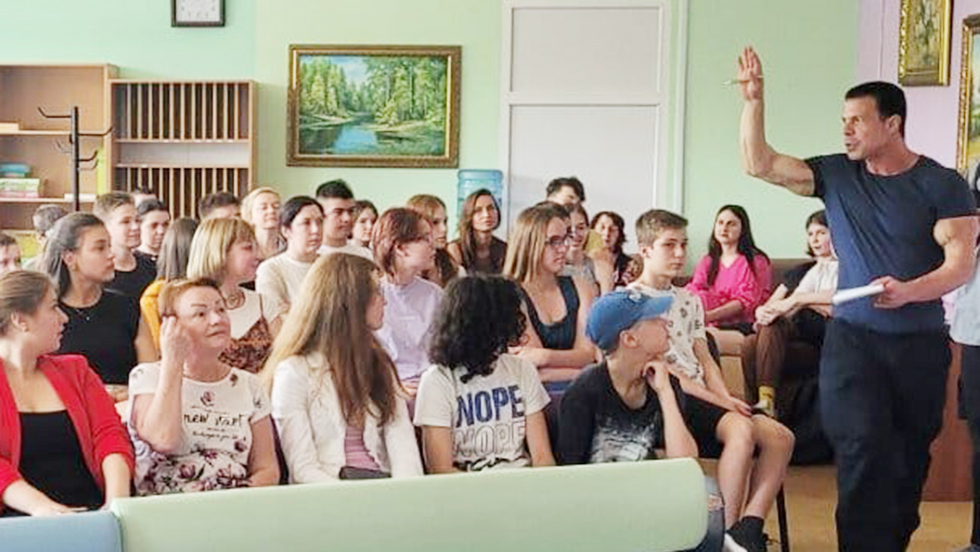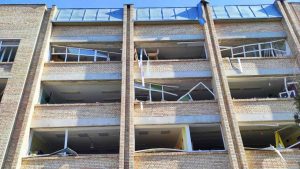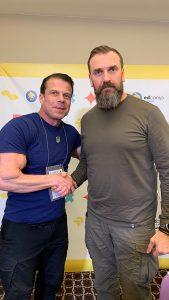
Carl Mirra, PhD, associate professor in the Ruth S. Ammon College of Education and Health Sciences, has made several service trips to Ukraine, and sees a school system in transformation. “We are witnessing a historic moment where democracy is being forged in schools and society amidst a crisis," he explains.
“I realized education is where the work is at. This is the future of Ukraine. This is how it’s going to become a democratic society—with these children and these students.”
In a recent interview, Carl Mirra, PhD, associate professor in the Adelphi University School of Education, explained his mission to promote democracy in war-torn Ukraine. After Russia invaded Ukraine in February 2022, Dr. Mirra made a trip there to conduct humanitarian work. His plan was to create an oral history of the foreign policy of the war, but then a light bulb went off.
“I saw firsthand how progressive and open-minded the Ukrainian youth are; they crave peace and freedom from occupation so that the progressive forces of the country can continue to build a non-corrupt, tolerant government and society,” Dr. Mirra said. He turned his attention to the educational system and the children of Ukraine.

The gymnasium of High School 34 was heavily damaged during a Russian strike on Kyiv.
Dr. Mirra is now working with the National Academy of Pedagogical Sciences of Ukraine and the nonprofit EdCamp Ukraine on two separate projects. The first aims to implement a civic education curriculum founded on democratic principles and values. The second will use oral history to help students of different demographics develop social-emotional resilience and writing skills. He’s applied for grants for each project.
Here’s a closer look at how Dr. Mirra’s work is impacting the lives of students, parents and teachers in Ukraine.
Fostering the values of freedom and dignity in Ukraine
In 2020–2023, Dr. Mirra conducted his research at schools across Ukraine, observing and leading classes, and holding interviews and focus groups with roughly 200 students, parents and teachers. He also interviewed the minister of education and members of the education committee of the country’s parliament. What he found was that there is a great need for strengthening civic education in promoting democratic values that inform the country’s school reform agenda, called the New Ukrainian School.
“There’s a new generation that is completely frustrated with the residue of old mindsets and wants to forge a democratic society,” Dr. Mirra said. “It’s motivated by the natural human impulse for freedom, to live in peace and free from an occupation that reminds many Ukrainians of a Soviet past marked by cynicism and distrust.”
If approved, Dr. Mirra’s three-year grant will allow him to gather more data and build a curriculum rooted in democratic values like tolerance and nondiscrimination.
“It may sound simple to us, but the school environment should be student-centered, should be focused on student strengths and open-ended inquiry,” Dr. Mirra said. “The idea that schools should be student-centered and focused on children’s self-actualization is relatively new in Ukraine.”
Dr. Mirra will continue work with the National Academy of Pedagogical Sciences of Ukraine, Institute of Problems on Education, as well as collaboration with teachers and students across 19 Ukrainian schools.
As current Minister of Education of Ukraine Oksen Lisovyi said, “We are building a school system based on the values of freedom and human dignity.”
Teaching social-emotional learning through oral history
As students learn and grow, social-emotional skills can help them connect with others, build self-awareness and foster healthy relationships. These skills can be particularly important for young people affected by violence and conflict.
Ukraine has launched a nationwide project to implement social-emotional learning in schools, and Dr. Mirra is contributing to it by using his experience in oral history and education to help students build social-emotional resiliency.
“Oral history is very participatory and it decenters authoritarian narratives,” Dr. Mirra said. “It allows students themselves to interview people and document history. It takes history out of the hands of the experts or authoritarians and puts it in the hands of the people.”

Dr. Mirra with Oksen Lisovyi, Ukraine’s Minister of Education.
A leader in teaching democracy
Dr. Mirra will work with EdCamp Ukraine, a nonprofit founded by Oleksandr Elkin that provides professional development services for a network of 40,000 schoolteachers, to help create an oral-history training manual for Ukrainian teachers.
“On the one hand, teachers could use their training to document their experiences of the war,” Dr. Mirra said. “They can also use the training as a tool in the classroom to promote social-emotional learning, which starts with things like collaboration, asking questions and the deep listening that cultivates empathy.”
Dr. Mirra hopes to expand the initiative by measuring the impact of oral history on students’ social and emotional competencies.
“As an educator, it’s incredibly exciting to watch a country and school system expunge these antiquated and corrupt attitudes and transform into a democratic and progressive system,” Dr. Mirra said. “That’s what’s happening right now. We are witnessing a historic moment where democracy is being forged in schools and society amidst a crisis.”